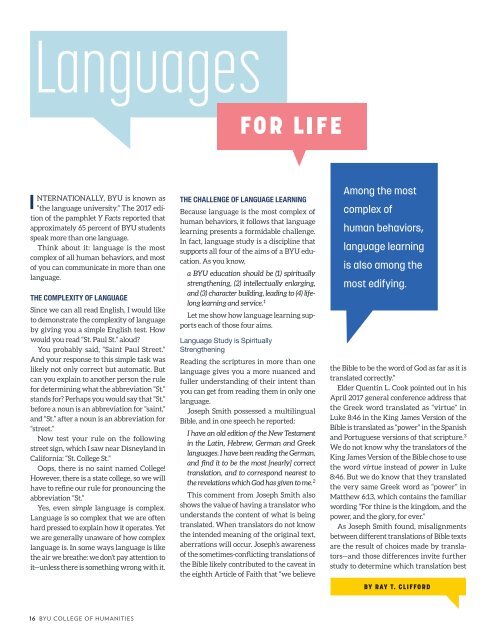Fall 2017
You also want an ePaper? Increase the reach of your titles
YUMPU automatically turns print PDFs into web optimized ePapers that Google loves.
NTERNATIONALLY, BYU is known as<br />
“the language university.” The <strong>2017</strong> edition<br />
of the pamphlet Y Facts reported that<br />
approximately 65 percent of BYU students<br />
speak more than one language.<br />
Think about it: language is the most<br />
complex of all human behaviors, and most<br />
of you can communicate in more than one<br />
language.<br />
THE COMPLEXITY OF LANGUAGE<br />
Since we can all read English, I would like<br />
to demonstrate the complexity of language<br />
by giving you a simple English test. How<br />
would you read “St. Paul St.” aloud?<br />
You probably said, “Saint Paul Street.”<br />
And your response to this simple task was<br />
likely not only correct but automatic. But<br />
can you explain to another person the rule<br />
for determining what the abbreviation “St.”<br />
stands for? Perhaps you would say that “St.”<br />
before a noun is an abbreviation for “saint,”<br />
and “St.” after a noun is an abbreviation for<br />
“street.”<br />
Now test your rule on the following<br />
street sign, which I saw near Disneyland in<br />
California: “St. College St.”<br />
Oops, there is no saint named College!<br />
However, there is a state college, so we will<br />
have to refine our rule for pronouncing the<br />
abbreviation “St.”<br />
Yes, even simple language is complex.<br />
Language is so complex that we are often<br />
hard pressed to explain how it operates. Yet<br />
we are generally unaware of how complex<br />
language is. In some ways language is like<br />
the air we breathe: we don’t pay attention to<br />
it—unless there is something wrong with it.<br />
THE CHALLENGE OF LANGUAGE LEARNING<br />
Because language is the most complex of<br />
human behaviors, it follows that language<br />
learning presents a formidable challenge.<br />
In fact, language study is a discipline that<br />
supports all four of the aims of a BYU education.<br />
As you know,<br />
a BYU education should be (1) spiritually<br />
strengthening, (2) intellectually enlarging,<br />
and (3) character building, leading to (4) lifelong<br />
learning and service. 1<br />
Let me show how language learning supports<br />
each of those four aims.<br />
Language Study is Spiritually<br />
Strengthening<br />
Reading the scriptures in more than one<br />
language gives you a more nuanced and<br />
fuller understanding of their intent than<br />
you can get from reading them in only one<br />
language.<br />
Joseph Smith possessed a multilingual<br />
Bible, and in one speech he reported:<br />
I have an old edition of the New Testament<br />
in the Latin, Hebrew, German and Greek<br />
languages. I have been reading the German,<br />
and find it to be the most [nearly] correct<br />
translation, and to correspond nearest to<br />
the revelations which God has given to me. 2<br />
This comment from Joseph Smith also<br />
shows the value of having a translator who<br />
understands the content of what is being<br />
translated. When translators do not know<br />
the intended meaning of the original text,<br />
aberrations will occur. Joseph’s awareness<br />
of the sometimes-conflicting translations of<br />
the Bible likely contributed to the caveat in<br />
the eighth Article of Faith that “we believe<br />
the Bible to be the word of God as far as it is<br />
translated correctly.”<br />
Elder Quentin L. Cook pointed out in his<br />
April <strong>2017</strong> general conference address that<br />
the Greek word translated as “virtue” in<br />
Luke 8:46 in the King James Version of the<br />
Bible is translated as “power” in the Spanish<br />
and Portuguese versions of that scripture. 3<br />
We do not know why the translators of the<br />
King James Version of the Bible chose to use<br />
the word virtue instead of power in Luke<br />
8:46. But we do know that they translated<br />
the very same Greek word as “power” in<br />
Matthew 6:13, which contains the familiar<br />
wording “For thine is the kingdom, and the<br />
power, and the glory, for ever.”<br />
As Joseph Smith found, misalignments<br />
between different translations of Bible texts<br />
are the result of choices made by translators—and<br />
those differences invite further<br />
study to determine which translation best<br />
16 BYU COLLEGE OF HUMANITIES


